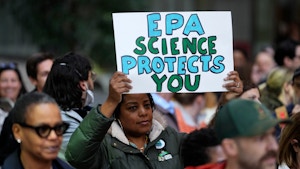Opinion / Kebijakan & Keuangan

The treaty, signed in 1996, expires next year, and there are unresolved issues with regards to water sharing arrangements. Both Bangladesh and India will need to negotiate a more thorough, equitable and climate-resilient deal.

Kebijakan & Keuangan
Philanthropy in an era of declining development aid
Some want philanthropy to fill the gap, and others have shamed governments for stepping back. The former is unrealistic, while the latter ineffective. But even with constrained budgets, governments can provide assistance to scale up proven solutions.

Kebijakan & Keuangan
Can COP30 succeed where COP29 failed?
There is scepticism around climate finance through private investments, and if private finance is to play a bigger role, policy reforms ahead of this year’s COP30 are needed. Alternatively, could the G20 or BRICS lead on climate finance?
Semua Kebijakan & Keuangan Opinion
8 April 2025
29 Maret 2025

Kebijakan & Keuangan
Trump’s Ukraine deal exposes a dirty truth about minerals
27 Maret 2025

Kebijakan & Keuangan
Financial inclusion must reach the last billion
26 Maret 2025

Kebijakan & Keuangan
Shake it up, don’t shoot it down: the case for reforming US aid

Kebijakan & Keuangan
A critical year for finance could shape fairer, more sustainable mining
25 Maret 2025

Kebijakan & Keuangan
Central banks must stem the nature crisis

Karbon & Iklim
Sustainability in an unstable world
24 Maret 2025

Kebijakan & Keuangan
Aid cuts could erase women from public life
17 Maret 2025
7 Maret 2025
4 Maret 2025

Karbon & Iklim
Nature needs its own ID
27 Februari 2025

Kebijakan & Keuangan
Adaro’s coal spin-off highlights gaps in bank coal exit policies
26 Februari 2025

Karbon & Iklim
Hong Kong’s new climate commissioner has a tough agenda
Terpopuler
-

Berita / Kebijakan & Keuangan
‘Global politics may change but the principles of nature do not’: Asean banks still hungry for transition-related deals, say CSOs
As a global climate banking alliance softened its stance on mandatory targets, some chief sustainability officers of Southeast … -

Berita / Energi
No ‘passive bystander’: Clean energy trade among Singapore’s ‘recalibrations’ to tackle new geopolitical reality
The republic will not retreat or “capitulate”, but will forge global cooperation to tackle challenges like climate change, … -
 The treaty, signed in 1996, expires next year, and there are unresolved issues with regards to water sharing …
The treaty, signed in 1996, expires next year, and there are unresolved issues with regards to water sharing … -

Podcasts / Karbon & Iklim
America’s attack on climate science could affect adaptation capacity in Asia: climate scientist Ben Horton
The sea-level rise expert has moved to Hong Kong – now seen as a gateway to more collaboration … -

Berita / Energi
New record-high US solar tariffs leave uneven impact across Southeast Asia’s solar industry
Cambodia, Vietnam, Thailand and Malaysia's solar panel makers face varying tariff rates. Chinese manufacturers have already moved operations … -

Berita / Energi
Is Southeast Asia on track to meet global clean energy targets?
Earth Day 2025 calls for action to triple clean electricity capacity by 2030. Eco-Business examines which countries in …










